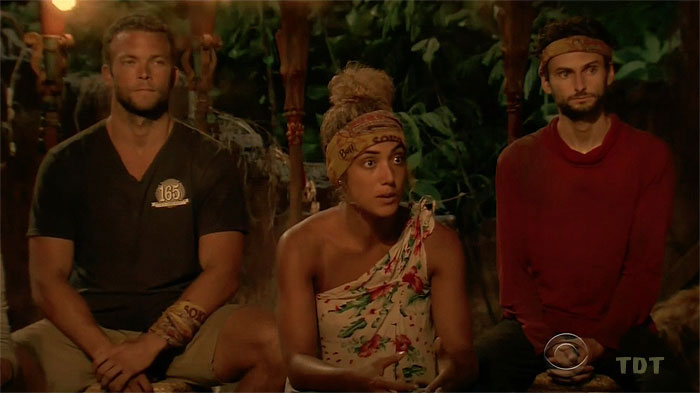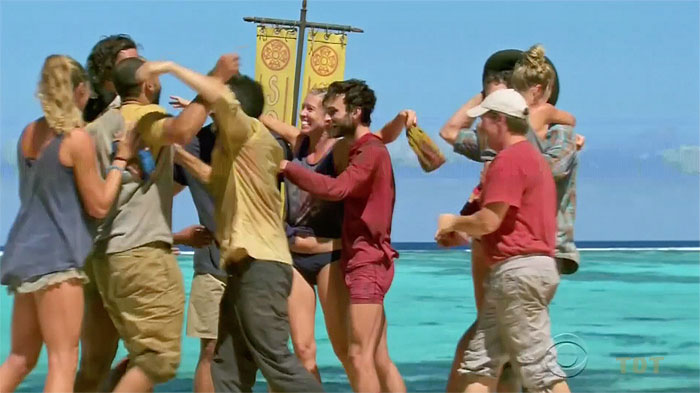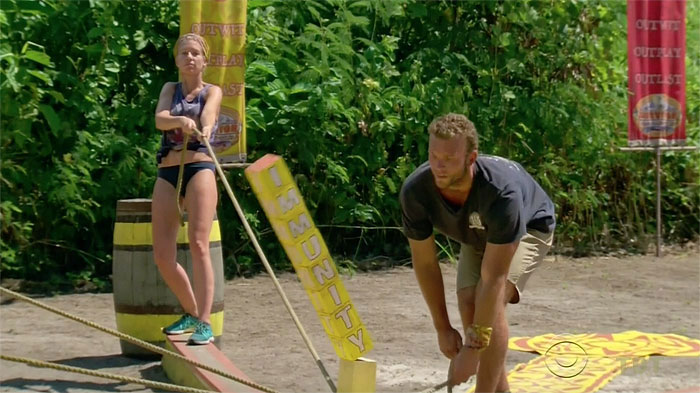

If there's been one consistent fan complaint about this season thus far, it's that the level of gameplay has been underwhelming. The phrase "boring" has been thrown around, and this time it's not in reference to a bug's movements within a contestant's ear canal. Despite claims that the demand for Big Moves™ is a figment of Jeff Probst's imagination, it seems that fans actually do want to see them, and with regularity. Never mind that they rarely happen in the pre-merge, except in grossly unfair miscarriages of justice, like Malcolm being idoled out by another tribe in an unpredecented (and thankfully thus far unrepeated) joint Tribal Council in Game Changers. About which, of course, fans also complained (rightfully, in that case).
To be fair, through Heroes v. Healers v. Hustlers' first six episodes, major, game-changing shifts in power have been in short supply. Or have they? Patrick, a big-time character who seemed protected by his pre-game friendship with Ali, was a surprising (especially to him) blindside victim in Episode 3. Jessica's vote-block advantage and Joe's correct idol play combined to successfully break a 2-2 standoff between former Heroes and Healers in Episode 4. After working with Ali from the start, Ryan abandoned her in Episode 5, and joined up with two people from another tribe to take out Ali's new friend, Roark. Then, just when it looked like everyone on Soko had decided (incorrectly) that JP was too much of a threat to allow to reach the merge, the vote tide flipped back on Ali again, taking her out pre-jury.
Sure, some things have been unsurprising, a lot of which has to do with sticking with three tribes all the way to the merge. Entering the game, the Hustlers tribe looked signficantly overmatched on paper, and that bore out in practice, as they produced three challenge losses and just one second-place finish over the first three episodes. After the swap, new Yawa's mix of brawn and brains made them clearly the superior tribe in challenges, and they ran away to four firsts and two seconds, against zero losses. That meant either Levu or Soko was almost definitely going to to Tribal each week, and this is where the three-tribe format hindered the gameplay most significantly. Entering this episode, both Levu and Soko had just four players left. That meant the options for this week's vote were: A 3-1 split, a 3-1 split a different way, or a highly unlikely 2-2 tie, followed by just two people drawing rocks (or possibly fire starting). Who's going to agree to that? Shockingly, it ended up a 3-1 vote. Maybe if we'd swapped to two tribes of 7 in the last episode, some more spectacular pre-merge fireworks might have burst forth. Or not. Either way, we didn't, and there weren't any.
Even so, Ali's departure was surprising in the context of the episode's editing, even though it made strategic sense for everyone involved. So while it seemed like a highly probable outcome entering the episode, somehow we were led astray by the episode's storytelling. Why is a surprise ending—even if it's one we don't particularly like—indicative of a boring season?
What's more, as we enter the second half of the season, at least seven of the remaining players are either playing active, strategically interesting games (Chrissy, Ryan, Joe), or have provided sufficiently compelling character moments that we'd understand the decision and be happy if they won (Ben, Lauren, Mike, Jessica). There are even some long-shot contenders who have seen limited action (Devon, Ashley) who could join that group. That's more than half the current contestants, which is both a testament to a fairly even-handed pre-merge edit, avoiding an obvious "coronation" vibe for any one particular contender, and to the overall quality of the cast.
So if you're bored... with the merge imminent, a lot of the structural impediments to gameplay (namely, tiny tribes) will be removed. It gets better. Hopefully.
The road ahead: Heroes vs. villains?

With the merge upon us, real Survivor is about to start, with far more than two distinct factions. Keeping three tribes this long may have limited the pre-merge gameplay, but it makes the post-merge opportunities a lot more plentiful. There are core pairs, groups with multiple fractures, and many overlapping and/or competing alliances that make the post-merge seem significantly more unpredictable than: "These two tribes will get together and pick off the third tribe" (as Kaoh Rong looked to be, until Aubry and Cydney derailed that).
Or at least it should, in theory.
Conventional wisdom argues that the obvious post-merge super-alliance will be just that: a joining of the remaining Heroes (Chrissy, JP, Ben, Ashley) and Hustlers (Ryan, Lauren, Devon). They have a 7-5 majority (although the minority Healers alliance has two idols), so it makes numerical sense for them to do so. And it's based on the sound reasoning that in the post-swap environment we're currently in, those alliances have already formed: Chrissy and JP with Ryan on Soko; Ben with Lauren on Yawa; and Ashley with Devon on Levu. All systems go, right? Woo-hoo! Predictability!
Well... maybe not. Despite the original tribal nomenclature, this season actually looks like it's turning into a clash of... heroes vs. villains.
Since the swap, a lot of emphasis has been placed on styles of gameplay, specifically the conflicting principles of deception and trust. Ryan and Chrissy have played a solid strategic game at Soko, but their moves haven't been entirely above-board. Last episode, Chrissy skillfully concocted a fake women's alliance to get passive buy-in from Roark, then using Roark's tepid endorsement to scare JP enough to get him to vote out a challenge asset. For his part, Ryan has now voted out a longtime ally, and just this episode, said of himself "I don't know why everybody wants to work with me, I think I'm a friggin' weasel." In contrast, Devon and Ashley have formed an alliance at Levu based on honesty, with Devon openly disparaging Joe's attempts to deceitfully secure Devon's vote, and titularly declaring "I Don't Like Having Snakes Around." (Luckily Ryan's a weasel and not a snake then, right?) Similarly, Ben and Lauren have bonded (somewhat) at Yawa over their shared disdain for Cole's perceived selfishness.
Now that they're merging, these old friends will be reunited, and those gameplay styles should definitely become a topic of conversation. Pre-swap Ben had a tight bond with Chrissy, pre-swap Devon had one with Ryan. Will those connections still hold firm after three tribes become one? Or will the "good guys"-type players eventually decide they've had enough of associating with underhanded, back-stabbing villains? The obvious Heroes-Hustlers super-alliance may not turn out to be as super as envisioned.
For that matter, there are similar fault lines within the original Healers tribe. Joe has been fun to watch, with his relentless, conflict-laden gameplay, even if his tribemates view him as a bit of villain. He now has his second idol of the game, but that seems to be his only true ally. Desi doesn't trust him, and seems open to siding instead with the Devon/Ashley hero-types. Mike also didn't trust Joe back in Episode 1, and Joe openly targeted Mike back at Healers camp. Then at Levu, Joe's deceptive tactics brought together a united Devon-Ashley (soon to be rejoined by JP) front against him. There's always a danger that Joe's reputation from his previous idol play will precede him, and that the merge tribe will unite in blindsiding him, in order to remove an obvious threat. Still, it's fun to ponder: Joe has never had the chance to play with Ryan or Chrissy. How much havoc could that trio wreak together? They're playing the most aggressive games, and could conceivably change the course of action at any time.
Meanwhile, Mike has at least listened and nodded along as Ben and Lauren have argued that Cole is a liability and/or threat. But is Mike really "with" them, or are his ties to Jessica—who as far as we know is the only other person who knows about his idol— and by association, Cole, still stronger? Where Mike and his idol decide to align themselves could have a lot to do with which faction(s) emerge triumphant, especially if he brings Jessica (and Cole) with him. The Healers are a bit of an untested-by-Tribal mess, and their deception vs. trust questions are a bit unanswerable, especially relative to those on the other two tribes.
One other factor in the deception-vs-trust narrative that could end up being important is that we're still waiting for Chrissy to play Ryan's now-fake Super Idol. Ryan and Chrissy know about it... but so does Devon. Will Devon view intentionally (and falsely) claiming that the Super Idol is functional as acceptable gameplay, or as something a "snake" would do? The pre-season Devon of "First One Out" would probably high-five Chrissy for that move, but would the straight-shooting Devon of the post-swap? That's a bit of an open question. Similarly, where will Ben and Lauren draw the line when it comes to idol bluffing plays?
So while both the numbers and the peripherals may argue the Healers are doomed post-merge, there are enough variables (mostly attached to medallions and wrapped in parchment) in play that, as one of them is wont to say, we should "never underestimate" them. Except maybe Cole. He's not winning this game. Apart from that, there are a lot of very different ways this season could turn out. Keep hope alive!
In search of meaningful team challenge stats

One goal of this site has been to develop ways to measure contestant performance, particularly in challenges, because challenge assets tend to be kept around for a while pre-merge, while challenge liabilities are often eliminated early. Because of that, challenge performance is a component in overall stats like SurvAv, which attempts to assess likelihood of survival. But clearly, this is tough in group challenges. One possibility is breaking group challenges down further, and counting things like performing key final tasks (firing slingshots in the IC, working a puzzle) and gaining, holding, or blowing leads. That might add a little more insight, although the lead change info depends quite a bit on whether the challenge is edited accurately. Often, contestants claim challenges were nowhere near as close as they appeared on TV, which is worrisome.
Furthermore, this episode aptly demonstrates the difficulty in trying to measure individual contributions to group challenges: Not all challenges are easily dissectable. In the reward challenge, two of the four people weren't required to do anything, except get to the boat in a timely fashion. And for two of the tribes, only one person worked the slingshot. So Chrissy and Ryan "won" mostly by sitting there. In contrast, the immunity challenge, everyone performed an equally critical part of the same task. While whichever (anonymous) person on Yawa figured out that the critical rope-holders were the two on the outside made an additional, highly important contribution, they all receive the credit for winning, while several people on Soko could have been performing optimally, but still lost due to some other (also anonymous) person's clumsiness.
In the end, the only realistic solution—barring unfettered access to full challenge footage, which seems a bit implausible—is to assume that in the end, all of this averages out, and we should simply assign credit for participating in wins. Just as we have been. People who win the most probably had some hand in actually accomplishing that feat, right? When you look at the list, Cole and Jessica winning 8.5 times out of 10 sounds about right, and Simone pulling off half a win in three tries also works.
| Rank | Contestant | Challenge wins | Challenges | Sit-outs | Win % |
|---|---|---|---|---|---|
| 1 | Cole | 8.5 | 10 | - | 0.85 |
| 1 | Jessica | 8.5 | 10 | - | 0.85 |
| 3 | Ben | 7 | 10 | - | 0.70 |
| 4 | Mike | 6.5 | 10 | 3 | 0.65 |
| 5 | Desi | 5.5 | 10 | - | 0.55 |
| 6 | Joe | 4.5 | 10 | 1 | 0.45 |
| 7 | Roark | 4 | 8 | - | 0.50 |
| 8 | Lauren | 4 | 10 | 3 | 0.40 |
| 8 | Ashley | 4 | 10 | - | 0.40 |
| 10 | JP | 3.5 | 10 | - | 0.30 |
| 10 | Chrissy | 3.5 | 10 | 1 | 0.30 |
| 12 | Devon | 2.5 | 10 | - | 0.25 |
| 13 | Alan | 2 | 6 | - | 0.33 |
| 14 | Ryan | 2 | 10 | 1 | 0.20 |
| 14 | Ali | 2 | 10 | - | 0.20 |
| 16 | Katrina | 0.5 | 2 | - | 0.25 |
| 17 | Simone | 0.5 | 3 | - | 0.17 |
| 18 | Patrick | 0.5 | 4 | - | 0.13 |
Notes: Rank was sorted by wins (with second place counting as half a win, except in the first post-swap RC, where second counted as a loss), then by win percentage.
 Jeff Pitman is the founder of the True Dork Times, and probably should find better things to write about than Survivor. So far he hasn't, though. He's also responsible for the Survivometer, calendar, boxscores, and contestant pages, so if you want to complain about those, do so in the comments, or on Bluesky: @truedorktimes
Jeff Pitman is the founder of the True Dork Times, and probably should find better things to write about than Survivor. So far he hasn't, though. He's also responsible for the Survivometer, calendar, boxscores, and contestant pages, so if you want to complain about those, do so in the comments, or on Bluesky: @truedorktimes
- Recaps index
- Pre-season: How old is too old to win?
- Pre-season: The Ivy Lead - S35 edition
- Pre-season: S35 - HHH cast projections
- Pre-season: TDT Survivor: HHH contestant draft
- Ep.1: Cramped, rushed, maybe some vomiting
- Ep.2: Signs point to the big three (or four)
- Ep.3: Three is the tragic number
- Ep.4: Resetting the table
- Ep.5: The mom and pop show
- Ep.6: Tepid for now, heating later?
- Ep.7: The downside of goats
- Ep.8: The spaghetti saga
- Ep.9: Fall o' the leaders?
- Eps.10-11: The state of the final eight... er, seven
- Ep.12: Good play vs. good TV
- Pre-Ep.14: Jury jeopardy - HvHvH
- Ep.13: What do juries want?
- Ep.14: Immunity vs. idols